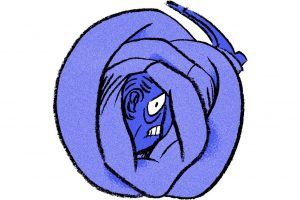Judith Newman in The New York Times:
 How did I know my anxiety had gotten the better of me? When I found myself taking meticulous notes on a forthcoming book by Erica Feldmann called HAUSMAGICK: Transform Your Home With Witchcraft (HarperOne, $25.99, available in March). The year 2018 hadn’t been so great, what with the death of a husband and, possibly, a republic. Maybe 2019 would be better if I bought certain purifying elements for my home. The right crystals, sage sticks and — salt? Apparently, you can sprinkle salt around the house after a person with “toxic energy” visits. Attention future dates: If you see me reaching for the shaker as you’re leaving, you know things haven’t gone well. If my nerves are frayed, I take cold comfort in knowing I’m not alone. Whether it’s our political situation, the jangling distractions of everyday life or the not-irrational sense that mankind’s need to find another planet isn’t just a sci-fi plotline, we seem to be in the midst of one massive freakout. Kierkegaard argued that anxiety stemmed from the “dizziness of freedom,” the paralysis that comes from infinite choice and possibility. That was in 1844. Imagine what he would have thought about today.
How did I know my anxiety had gotten the better of me? When I found myself taking meticulous notes on a forthcoming book by Erica Feldmann called HAUSMAGICK: Transform Your Home With Witchcraft (HarperOne, $25.99, available in March). The year 2018 hadn’t been so great, what with the death of a husband and, possibly, a republic. Maybe 2019 would be better if I bought certain purifying elements for my home. The right crystals, sage sticks and — salt? Apparently, you can sprinkle salt around the house after a person with “toxic energy” visits. Attention future dates: If you see me reaching for the shaker as you’re leaving, you know things haven’t gone well. If my nerves are frayed, I take cold comfort in knowing I’m not alone. Whether it’s our political situation, the jangling distractions of everyday life or the not-irrational sense that mankind’s need to find another planet isn’t just a sci-fi plotline, we seem to be in the midst of one massive freakout. Kierkegaard argued that anxiety stemmed from the “dizziness of freedom,” the paralysis that comes from infinite choice and possibility. That was in 1844. Imagine what he would have thought about today.
But here’s some good news: If we’re all a little tense, well, there’s a book for that. Many books, actually. Several of the ones I consulted were so wrongheaded or incomprehensible they made me more nervous. (“Motivation is a Unicorn Fart” almost made me hurl in a glittery rainbow arc.) Here are three that worked.
Recently a friend told me that he had reached what he calls his vidpoint: the moment you realize you have more movie hours stored on your DVR than you have hours left to live. I thought about that friend while reading Matt Haig’s NOTES ON A NERVOUS PLANET (Penguin, paper, $16), a follow-up to his previous book “Reasons to Stay Alive,” which chronicled his struggles with anxiety and depression. The core of first-world malaise, he argues, can be summed up by something T. S. Eliot observed in “Four Quartets”: We are “distracted from distraction by distraction.” Here, in clever chapterettes and listicles (he seems to assume we’re all too jumpy to read more than a few pages at a time), Haig muses about our anxieties: our fears of aging, of not being rich, of not being beautiful or successful enough. All while being massive consumers of everything.
More here.
